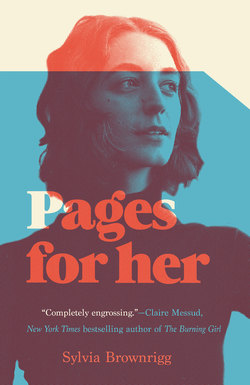Читать книгу Pages For Her - Sylvia Brownrigg - Страница 13
На сайте Литреса книга снята с продажи.
5
ОглавлениеFlannery was thirty when she met Charles Marshall at an opening in San Francisco. It was a milling around, wine-drinking, opinion-scattering affair set on several floors of Geary Street galleries – neon acrylic smears hanging in one room, surreal porcelain masks displayed in another – that her roommate had taken Flannery to in order to force her out of a motionless glummery.
‘Come on, Jansen.’ Susan Kim had known Flannery since they were in their late, matriculating teens, and had been drawn to each other because they both sensed something tough and fibrous in the other under the mass of freshman mush. ‘We’ve got to get you out of here.’
Flannery had gone so far already, these recent years; she was not sure she could go a single step further.
She had left home at seventeen, flown over many flyover states to attend a famous and foreign university. Once there, she had waded far and wide and deep into love. (The furthest she had ever gone. Her Anne.) After graduating, she had gotten a job in publishing and moved to New York, in order to prove to a woman she was no longer even in touch with that she could take on that never-sleeping city. A couple of years later she made the decision to adventure across Mexico for a year with a girlfriend, a trip which culminated in an encounter with a garrulous, ageing American hippie in San Miguel de Allende who happened to be Flannery’s father Len, a parent she had never previously met. She had returned to New York and, at twenty-five, gone so far as to do what she had always meant to do: write. She produced a wry, racy memoir of the girls’ circuitous odyssey and that fraught paternal meeting. A Visit to Don Lennart, a book of wit and raunch and many-pixeled vividness, spent months on the bestseller list and handed Flannery her quarter hour of fame. Under duress, she had pushed herself to appear on television and radio to talk about herself and her story, a degree of exposure that Flannery had foolishly not anticipated, and which led to a strange interior dislocation. She began to find herself hard to find. Still in motion, Flannery carried on to write a second book, because everyone told her to while she was still hot – as if her name were a potato, or a pizza – but this second was a novel with subdued characters set in a remote and not quite real California, pulled from some mournful place within her and in which she deliberately chose to avoid any autobiographical elements. After Flannery finally clawed her way back from the dark dream of its composition she learned that the book had gone largely unread, consigned to the death heap of fictions deemed to be quiet. By this point fairly unmoored, Flannery went a little crazy and cheated on her girlfriend Adele, who had been her companion in Mexico and had anyway never recovered from the shock of being turned into a character in her lover’s pages. Flannery drifted into the deserved, expected, but nonetheless distressing breaking apart of that relationship. She had finally, in a combination of resignation and surrender, retreated to San Francisco to recover, the best part of which was that she could live again with her old college roommate Susan Kim, who now worked at a boutique fashion designer’s and was as stylish, smart and impatient as she had always been.
‘I can’t move a millimeter. I’m exhausted,’ Flannery protested from the chic second-hand daybed by the window. ‘Wake me up when it’s time to vote for the president.’ But Susan, undeterred, dragged her out anyway, with the authority of a decade-old friendship and to thwart Flannery’s desire to stay in watching an entire season of a television show about the mob. Susan made Flannery dress, and dress presentably. ‘You’re getting some oxygen. Like it or not, lady.’
And there, under gallery lighting, in a room with stark, gorgeous desert photographs Flannery mistakenly thought were his, she met the artist Charles Marshall, a large and charismatic man, who with his stories and attention took her far away from herself – which was precisely where Flannery Jansen wanted to be.
